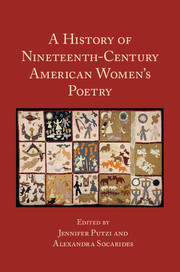Book contents
- Frontmatter
- Contents
- List of Illustrations
- List of Contributors
- Acknowledgments
- Introduction: Making History: Thinking about Nineteenth-Century American Women's Poetry
- PART I 1800–1840, AMERICAN POESIS AND THE NATIONAL IMAGINARY
- 1 Claiming Lucy Terry Prince: Literary History and the Problem of Early African American Women Poets
- 2 Before the Poetess: Women's Poetry in the Early Republic
- 3 The Passion for Poetry in Lydia Sigourney and Elizabeth Oakes Smith
- 4 Album Verse and the Poetics of Scribal Circulation
- 5 Presents of Mind: Lydia Sigourney, Gift Book Culture, and the Commodification of Poetry
- 6 The Friendship Elegy
- 7 Gendered Atlantic: Lydia Sigourney and Felicia Hemans
- PART II 1840–1865, UNIONS AND DISUNIONS
- PART III 1865–1900, EXPERIMENT AND EXPANSION
- Suggested Further Reading
- Index
4 - Album Verse and the Poetics of Scribal Circulation
from PART I - 1800–1840, AMERICAN POESIS AND THE NATIONAL IMAGINARY
Published online by Cambridge University Press: 21 January 2017
- Frontmatter
- Contents
- List of Illustrations
- List of Contributors
- Acknowledgments
- Introduction: Making History: Thinking about Nineteenth-Century American Women's Poetry
- PART I 1800–1840, AMERICAN POESIS AND THE NATIONAL IMAGINARY
- 1 Claiming Lucy Terry Prince: Literary History and the Problem of Early African American Women Poets
- 2 Before the Poetess: Women's Poetry in the Early Republic
- 3 The Passion for Poetry in Lydia Sigourney and Elizabeth Oakes Smith
- 4 Album Verse and the Poetics of Scribal Circulation
- 5 Presents of Mind: Lydia Sigourney, Gift Book Culture, and the Commodification of Poetry
- 6 The Friendship Elegy
- 7 Gendered Atlantic: Lydia Sigourney and Felicia Hemans
- PART II 1840–1865, UNIONS AND DISUNIONS
- PART III 1865–1900, EXPERIMENT AND EXPANSION
- Suggested Further Reading
- Index
Summary
The vast majority of poems written in the nineteenth century were never published. While poems were major components of American popular media, appearing in newspapers, magazines, anthologies, schoolbooks, broadsides, and other print formats, they proliferated even more widely in an active culture of manuscript circulation by non-professional writers. Unlike novels, plays, lectures, and other literary genres, which can be said to come into existence (in a strict generic sense) only upon publication or performance, poetry has a long history of scribal production and informal modes of copying and exchange among coteries. The poems of John Donne, to give a canonical example, exist in more than 5,000 distinct seventeenth-century manuscript collations, far exceeding the number of printed copies that circulated in his lifetime. Because each collation had its own network of exchange, Donne's coterie audience was likely larger than the readership of his books, which were published only with his reluctant participation. Indeed, scholars now speculate that some of the most popular and influential poets of the seventeenth century were never “published,” as that event is understood today.
Over the course of the eighteenth century, literariness came to be associated with print publication, even for women writers, who had faced special prohibitions against it, while authorship, which had acquired new associations with originality and ownership, became more consolidated as a standard for judging literary value. Nevertheless, scribal poetic circles remained important in North America, and some of the most prominent eighteenth-century colonial poets, such as Henry Brooke, Lewis Morris, Susanna Wright, Hannah Griffitts, Jane Colman Turrell, Phillis Wheatley, and Annis Boudinot Stockton, wrote for coterie exchange. As the publishing market for poetry expanded, manuscript composition increased as well, and through the nineteenth century poetry writing was an activity for people who had no ambition to become professional authors. Ralph Waldo Emerson noted as much in “New Poetry” (1840):
[A] revolution in literature is now giving importance to the portfolio over the book. Only one man in the thousand may print a book, but one in ten or one in five may inscribe his thoughts, or at least with short commentary his favorite readings in a private journal. … This new taste for a certain private or household poetry, for somewhat less pretending than the festal and solemn verses which are written for the nations, really indicates, we suppose, that a new style of poetry exists.
- Type
- Chapter
- Information
- A History of Nineteenth-Century American Women's Poetry , pp. 68 - 86Publisher: Cambridge University PressPrint publication year: 2016
- 16
- Cited by



